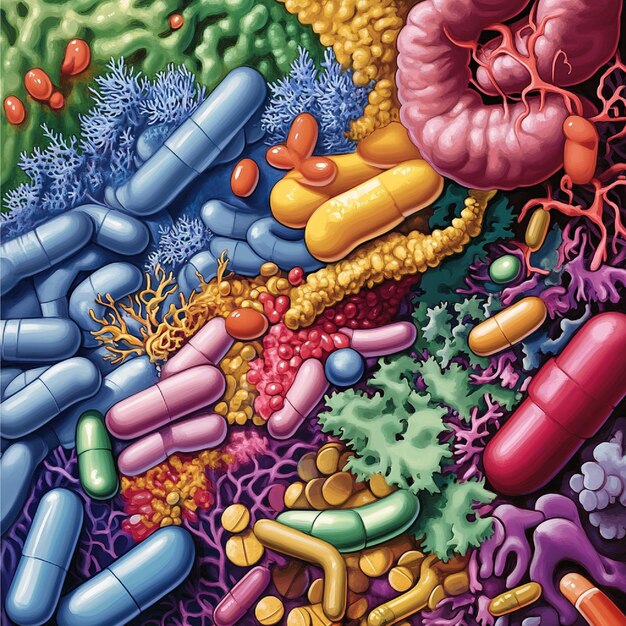The Power of Probiotics: Choosing the Right Strain for Your Health

The Power of Probiotics: Choosing the Right Strain for Your Specific Health Needs involves understanding the diverse types of probiotics and their unique benefits for gut health, immunity, mental well-being, and specific conditions like IBS, ensuring a targeted and effective approach to supplementation.
Discover the power of probiotics: choosing the right strain for your specific health needs is crucial for maximizing their benefits. Not all probiotics are created equal, and understanding their diverse effects can significantly impact your overall well-being.
Understanding the Basics of Probiotics
Probiotics are live microorganisms that, when administered in adequate amounts, confer a health benefit on the host. They are often referred to as “good” or “helpful” bacteria because they help keep your gut healthy. Understanding their role is the first step in harnessing the power of probiotics: choosing the right strain for your specific health needs.
These beneficial bacteria are naturally found in your body, but they can also be consumed through fermented foods and dietary supplements. By understanding what probiotics are and how they work, you can make informed choices about incorporating them into your daily routine.
What are Probiotics?
Probiotics are live microorganisms, primarily bacteria and yeasts, that offer health benefits when consumed. They work by improving the balance of your gut microbiota, which is the community of microorganisms living in your digestive system.
These microorganisms aid in digestion, nutrient absorption, and immune function. When the balance of gut bacteria is disrupted, it can lead to various health issues, which is where probiotics can play a crucial role.
How Probiotics Work
Probiotics work through various mechanisms, influencing the gut microbiome and immune system. They can help restore a healthy balance of gut bacteria by competing with harmful bacteria and producing substances that inhibit their growth.
Additionally, probiotics can enhance the gut barrier function, preventing harmful substances from entering the bloodstream and stimulating the immune system to produce antibodies and immune cells. This complex interplay can lead to improved digestive health and overall well-being.

- Improving Gut Health: Probiotics aid in digestion and nutrient absorption.
- Boosting Immunity: They stimulate the immune system and produce antibodies.
- Restoring Balance: Probiotics help maintain a healthy gut microbiota by competing with harmful bacteria.
- Enhancing Gut Barrier: They strengthen the gut lining, preventing harmful substances from entering the bloodstream.
In conclusion, understanding the basics of probiotics is essential for anyone looking to improve their health. By knowing what they are and how they work, you can select the most effective strains for your specific needs.
The Gut Microbiome and Its Importance
The gut microbiome is a complex ecosystem of trillions of microorganisms, including bacteria, viruses, fungi, and other microbes, that reside in your digestive tract. Its importance cannot be overstated, as it plays a critical role in various aspects of your health. Understanding its workings underscores the power of probiotics: choosing the right strain for your specific health needs.
This intricate community of microorganisms affects everything from digestion and nutrient absorption to immune function and mental health. Maintaining a healthy gut microbiome is essential for overall well-being.
What is the Gut Microbiome?
The gut microbiome is the collective term for the vast array of microorganisms living in your digestive tract. It’s a dynamic and diverse community that includes both beneficial and harmful bacteria, as well as other types of microbes.
The balance between these different types of microorganisms is crucial for maintaining gut health. When the balance is disrupted, it can lead to various health problems, including digestive disorders, immune dysfunction, and even mental health issues.
The Role of the Gut Microbiome in Health
The gut microbiome plays several vital roles in maintaining your health. It aids in the digestion of food, particularly complex carbohydrates that your body cannot break down on its own. It also helps in the absorption of essential nutrients, such as vitamins and minerals.
Furthermore, the gut microbiome is intimately involved in immune function. It helps train the immune system to distinguish between harmful and harmless substances, and it produces substances that boost the immune response. A healthy gut microbiome is also linked to improved mental health, as the gut and brain communicate through the gut-brain axis.
Factors Affecting the Gut Microbiome
Several factors can influence the composition and function of the gut microbiome. Diet is one of the most significant factors, as the types of foods you eat can either promote the growth of beneficial bacteria or favor the growth of harmful bacteria.
Other factors that can affect the gut microbiome include antibiotics, stress, age, genetics, and environmental exposures. Understanding these factors can help you make informed choices to support a healthy gut microbiome.
- Diet: Influences the growth of beneficial and harmful bacteria.
- Antibiotics: Can disrupt the balance of the gut microbiome.
- Stress: Impacts the composition and function of the gut microbiome.
In conclusion, the gut microbiome is a critical component of your overall health. By understanding its role and the factors that affect it, you can take steps to cultivate a healthy gut microbiome and reap the many benefits it offers.
Different Strains of Probiotics and Their Specific Benefits
Not all probiotics are created equal. Different strains of probiotics have different effects on the body, and understanding these differences is key to the power of probiotics: choosing the right strain for your specific health needs. Selecting the right strain can optimize the benefits you receive from probiotic supplementation.
Some strains are particularly effective for digestive health, while others are better suited for boosting immunity or improving mental health. It’s important to choose a strain that aligns with your specific health goals.

Lactobacillus
Lactobacillus is one of the most common types of probiotics. It is found in many fermented foods, such as yogurt and sauerkraut, and is often used in probiotic supplements. Lactobacillus strains are known for their ability to improve digestive health and boost immunity.
Specific Lactobacillus strains, such as *Lactobacillus acidophilus* and *Lactobacillus rhamnosus*, have been shown to be effective in treating diarrhea, reducing bloating, and improving nutrient absorption.
Bifidobacterium
Bifidobacterium is another common type of probiotic that is found in the gut microbiome. It is particularly prevalent in infants and plays a crucial role in immune development. Bifidobacterium strains are often used to treat irritable bowel syndrome (IBS) and other digestive disorders.
Specific Bifidobacterium strains, such as *Bifidobacterium infantis* and *Bifidobacterium longum*, have been shown to reduce abdominal pain, bloating, and constipation in individuals with IBS. These strains can also enhance immune function and reduce the risk of respiratory infections.
Saccharomyces boulardii
Saccharomyces boulardii is a unique type of probiotic that is actually a yeast rather than a bacterium. It is often used to treat diarrhea, particularly antibiotic-associated diarrhea, and can also help prevent *Clostridium difficile* infections.
Saccharomyces boulardii works by inhibiting the growth of harmful bacteria and toxins in the gut. It can also improve the gut barrier function and reduce inflammation, making it a valuable probiotic for those with digestive issues.
- Lactobacillus: Improves digestion and boosts immunity.
- Bifidobacterium: Treats IBS and enhances immune function.
- Saccharomyces boulardii: Prevents antibiotic-associated diarrhea and *C. difficile* infections.
In conclusion, different strains of probiotics offer different health benefits. By understanding the specific effects of each strain, you can choose the right probiotic to support your individual health needs and goals.
Probiotics for Digestive Health
One of the primary benefits of probiotics is their ability to improve digestive health. Probiotics can help alleviate a variety of digestive issues, from occasional bloating to chronic conditions like IBS. Understanding how probiotics can aid digestion highlights the power of probiotics: choosing the right strain for your specific health needs.
By restoring the balance of gut bacteria, probiotics can promote healthy digestion and reduce the risk of digestive disorders.
Probiotics and Irritable Bowel Syndrome (IBS)
IBS is a common digestive disorder that causes abdominal pain, bloating, gas, and changes in bowel habits. Probiotics have been shown to be effective in alleviating some of these symptoms, particularly abdominal pain and bloating.
Specific strains, such as *Bifidobacterium infantis* and *Lactobacillus plantarum*, have been studied extensively and found to reduce the severity of IBS symptoms. These strains can help restore the balance of gut bacteria and reduce inflammation in the digestive tract.
Probiotics and Diarrhea
Diarrhea is a common digestive issue that can be caused by a variety of factors, including infections, antibiotics, and dietary changes. Probiotics can help prevent and treat diarrhea by restoring the balance of gut bacteria and inhibiting the growth of harmful bacteria.
Specific strains, such as *Lactobacillus rhamnosus* and *Saccharomyces boulardii*, have been shown to be particularly effective in treating diarrhea. These strains can help reduce the duration and severity of diarrhea episodes.
Probiotics and Bloating
Bloating is another common digestive issue that can cause discomfort and embarrassment. Probiotics can help reduce bloating by improving digestion and reducing the production of gas in the gut.
Specific strains, such as *Bifidobacterium longum* and *Lactobacillus acidophilus*, have been shown to be effective in reducing bloating. These strains can help break down complex carbohydrates and reduce the amount of gas produced during digestion.
- IBS: Alleviates abdominal pain and bloating.
- Diarrhea: Prevents and treats diarrhea by restoring gut bacteria balance.
- Bloating: Reduces bloating by improving digestion and reducing gas production.
- Overall Digestion: Promotes healthy digestion and reduces the risk of digestive disorders.
In conclusion, probiotics can be a valuable tool for improving digestive health. By choosing the right strains for your specific needs, you can alleviate digestive issues and promote overall well-being.
Probiotics for Immunity
In addition to their benefits for digestive health, probiotics can also play a significant role in boosting immunity. The gut microbiome is closely linked to the immune system, and probiotics can help strengthen this connection. Understanding the immune-boosting properties of probiotics enhances the power of probiotics: choosing the right strain for your specific health needs.
By stimulating the immune system and producing antibodies, probiotics can help protect against infections and improve overall immune function.
How Probiotics Boost Immunity
Probiotics boost immunity through several mechanisms. They can stimulate the production of immune cells, such as T cells and B cells, which help fight off infections. They can also enhance the production of antibodies, which are proteins that recognize and neutralize harmful pathogens.
Furthermore, probiotics can improve the gut barrier function, preventing harmful substances from entering the bloodstream and triggering an immune response. By strengthening the gut-immune connection, probiotics can help protect against a variety of infections and illnesses.
Probiotics and Respiratory Infections
Respiratory infections, such as the common cold and the flu, are a major cause of illness worldwide. Probiotics have been shown to reduce the risk and severity of respiratory infections by boosting the immune system.
Specific strains, such as *Lactobacillus rhamnosus* and *Bifidobacterium bifidum*, have been studied extensively and found to reduce the incidence and duration of respiratory infections. These strains can help stimulate the immune system and produce antibodies that fight off respiratory viruses.
Probiotics and Allergic Reactions
Allergic reactions occur when the immune system overreacts to harmless substances, such as pollen or food. Probiotics can help reduce the risk and severity of allergic reactions by modulating the immune response.
Specific strains, such as *Lactobacillus casei* and *Bifidobacterium longum*, have been shown to be effective in reducing allergic reactions. These strains can help regulate the immune system and prevent it from overreacting to allergens.
- Stimulating Immune Cells: Probiotics enhance the production of T cells and B cells.
- Enhancing Antibody Production: They strengthen the immune system’s ability to neutralize pathogens.
- Improving Gut Barrier Function: Probiotics prevent harmful substances from entering the bloodstream.
In conclusion, probiotics can be a valuable tool for boosting immunity. By choosing the right strains for your specific needs, you can protect against infections and improve overall immune function.
Probiotics for Mental Health
The gut-brain axis is a bidirectional communication system between the gut microbiome and the brain. Probiotics can influence this system and have a positive impact on mental health. Understanding this connection highlights the power of probiotics: choosing the right strain for your specific health needs in the context of mental well-being.
By modulating the gut microbiome, probiotics can help reduce symptoms of anxiety, depression, and other mental health disorders.
The Gut-Brain Axis
The gut-brain axis is a complex network of nerves, hormones, and immune cells that connect the gut microbiome and the brain. This system allows for bidirectional communication, meaning that the gut can influence the brain and vice versa.
The gut microbiome plays a crucial role in the gut-brain axis. It can produce neurotransmitters, such as serotonin and dopamine, which are involved in mood regulation. It can also influence the production of brain-derived neurotrophic factor (BDNF), which is important for brain health.
Probiotics and Anxiety
Anxiety is a common mental health disorder that affects millions of people worldwide. Probiotics have been shown to reduce symptoms of anxiety by modulating the gut-brain axis.
Specific strains, such as *Lactobacillus rhamnosus* and *Bifidobacterium longum*, have been studied extensively and found to reduce anxiety symptoms. These strains can help regulate the production of neurotransmitters and reduce inflammation in the brain.
Probiotics and Depression
Depression is another common mental health disorder that can have a significant impact on quality of life. Probiotics have been shown to improve symptoms of depression by modulating the gut-brain axis.
Specific strains, such as *Lactobacillus acidophilus* and *Bifidobacterium bifidum*, have been shown to be effective in improving mood and reducing symptoms of depression. These strains can help increase the production of serotonin and other neurotransmitters that are involved in mood regulation.
- Modulating the Gut-Brain Axis: Probiotics influence the communication between the gut and the brain.
- Reducing Anxiety: Specific strains can reduce anxiety symptoms by regulating neurotransmitter production.
- Improving Depression: Probiotics can improve mood and reduce symptoms of depression.
In conclusion, probiotics can have a positive impact on mental health by modulating the gut-brain axis. By choosing the right strains for your specific needs, you can improve symptoms of anxiety, depression, and other mental health disorders.
| Key Point | Brief Description |
|---|---|
| 🌱 Gut Health | Probiotics balance gut bacteria, aiding digestion and nutrient absorption. |
| 🛡️ Immunity | Probiotics boost immune function by stimulating immune cells and antibody production. |
| 🧠 Mental Health | Probiotics influence the gut-brain axis, potentially reducing anxiety and depression. |
| 💪 Strain Specificity | Different probiotic strains offer unique benefits; choose based on your health needs. |
Frequently Asked Questions (FAQ)
▼
Probiotics are live microorganisms that, when consumed in adequate amounts, offer health benefits. They primarily work by improving gut health, enhancing immunity, and even influencing mental well-being through the gut-brain axis.
▼
Choosing the right strain depends on your health goals. Lactobacillus is good for digestion, Bifidobacterium for IBS, and Saccharomyces boulardii for diarrhea. Research and consulting a healthcare provider can help.
▼
Yes, probiotics can help alleviate digestive issues. Specific strains like *Bifidobacterium infantis* can reduce IBS symptoms, while others can reduce bloating by improving digestion and reducing gas production.
▼
Probiotics are generally safe, but some people may experience mild side effects like gas, bloating, or diarrhea, especially when first starting them. These symptoms usually subside as the body adjusts.
▼
Probiotics can be found in various fermented foods such as yogurt, kefir, sauerkraut, kimchi, and kombucha. Incorporating these foods into your diet can help boost your probiotic intake naturally.
Conclusion
In conclusion, understanding the power of probiotics: choosing the right strain for your specific health needs is crucial for optimizing your overall well-being. By considering the diverse benefits and mechanisms of different probiotic strains, you can make informed decisions to support your digestive health, immunity, and even mental health.





